|
|
|
Sort Order |
|
|
|
Items / Page
|
|
|
|
|
|
|
| Srl | Item |
| 1 |
ID:
143920
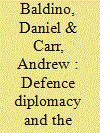

|
|
|
|
|
| Summary/Abstract |
The practice of military-to-military engagement has been strongly embraced in the last few decades as a central tool for strategic management. Many governments in the Asia-Pacific, including Australia, have accepted the practice as an instrument of statecraft to achieve comprehensive strategic outcomes: as a means of defusing tensions, reducing hostility and shaping the behaviour of states towards each other. This article examines Australia's broad approach and practice, and argues that such transformative ambitions are overstated. The evidence suggests that the benefits from defence diplomacy are evident at the tactical and operational level. It is a mode to deal with precise and immediate security issues, as opposed to the moulding of major strategic settings. This indicates the need to better recognise the limitations and conceptual flaws of defence diplomacy, and to reformulate Australian defence channels and related engagement prescriptions towards a more cautious, pragmatic and ultimately security-related stance. Through the use of case-study analysis, this research identifies both opportunities and constraints in conducting defence diplomacy, while offering guidelines for its future implementation in the region.
|
|
|
|
|
|
|
|
|
|
|
|
|
|
|
|
| 2 |
ID:
188346
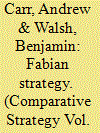

|
|
|
|
|
| Summary/Abstract |
The Fabian strategy is one of the most famous military strategies. Yet beyond notions of withdrawal and trading “space for time”, there is little clarity in the literature about how it operates. In this article, we develop a framework to explain the strategy based wearing down an adversary over time and then seeking a battlefield decision. We also examine contingent factors in shaping success or failure. In the final section, we explore what the Fabian strategy, famous for its use of time, tells us about acting strategically in the temporal domain.
|
|
|
|
|
|
|
|
|
|
|
|
|
|
|
|
| 3 |
ID:
138231
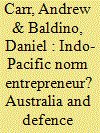

|
|
|
|
|
| Summary/Abstract |
The Indian Ocean is a region of increasing importance, with booming economic opportunities, shifting power dynamics and rising geopolitical competition. To manage this transition some Australian policy-makers are advocating the practice of defence diplomacy as a mechanism to help mould cooperative practices and to build regional trust while dissipating potential or ongoing regional flashpoints. Australia’s 2013 Defence White Paper identified Australia as an agent who can play a critical part in the emergence of certain types of norms as a means of conflict prevention and crisis management in the Indo-Pacific region. This paper explores the use of defence diplomacy as a means for seeking regional influence. It uses an innovative new framework of norm entrepreneurship to examine the choices facing Australian policymakers in increasingly complex security environment. This paper argues that while Australia should aim to promote defence diplomacy as a central part of rising security dialogue and practice with ‘like-mined’ countries, there must also be careful reflection to ensure that this objective is a constructive use of a middle power’s limited resources and influence.
|
|
|
|
|
|
|
|
|
|
|
|
|
|
|
|
| 4 |
ID:
127353
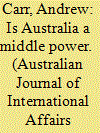

|
|
|
|
|
| Publication |
2014.
|
| Summary/Abstract |
This article examines whether Australia is a middle power. It identifies the three most popular approaches to defining a middle power: by a country's position, behaviour and identity. The article tests each definition against Australia, highlighting the strengths and weaknesses of each. Highlighting an earlier systemic approach to defining states, an alternative 'systemic impact' definition for middle powers is proposed. This approach, it is argued, provides a more comprehensive manner for identifying whether a country like Australia is a middle power, along with the implications for international security.
|
|
|
|
|
|
|
|
|
|
|
|
|
|
|
|
| 5 |
ID:
177990
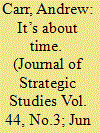

|
|
|
|
|
| Summary/Abstract |
Strategy is action in space and time. It is impossible to conceive of strategic behaviour outside of time, and the management of temporal factors plays a substantial role in determining the path and outcome of conflict. Yet time’s role in strategy has been empirically under-studied and theoretically neglected by scholars. This paper addresses this by identifying four constituent concepts of time for strategists: Order, Duration, Significance and Transition. The paper explores how each applies to and can improve our understanding of strategic behaviour. The paper concludes by outlining some of the promising avenues of policy opportunity and scholarly research.
|
|
|
|
|
|
|
|
|
|
|
|
|
|
|
|
| 6 |
ID:
190284


|
|
|
|
|
| Summary/Abstract |
In September 2021, Australia, the United Kingdom, and the United States captured the world’s attention with a technology and capability-sharing partnership known as AUKUS. For many, this was yet another example of the closeness of the alliance between the United States and Australia, which was initially formalized in the 1951 Australia, New Zealand, United States Security Treaty (ANZUS), from which New Zealand was suspended in 1986. Yet, however strong the public narrative seems, American and Australian officials have expressed concern and confusion about each other’s behavior in recent years, and well-connected scholars have warned of “complacency” and “expectation gaps” while identifying divergences in the interests, behavior, and outlook of the United States and Australia.Footnote1
|
|
|
|
|
|
|
|
|
|
|
|
|
|
|
|
|
|
|
|
|